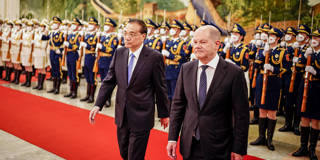Since Russia's invasion of Ukraine, the German government has been signaling a shift away from a foreign policy that has long been regarded as too passive and ambiguous. But a continuing pattern of indecisiveness and uncoordinated decision-making suggests that old habits die hard.
BERLIN – Just days after Russia’s invasion of Ukraine, German Chancellor Olaf Scholz declared that Germany’s approach to defense and foreign policy would undergo a Zeitenwende (epochal change). And in various commentaries and speeches since then, he has reiterated his commitment to deeper European security integration and economic coordination. Then, in September, German Foreign Minister Annalena Baerbock announced that Germany would adopt a more values-based feminist foreign policy to defend the liberal order against autocracy.
The intended message is that Germany will abandon a foreign policy that many others have criticized as being too passive, intransigent, and ambiguous. For many decades, Germany was all too willing to do business with autocrats, despite its professed commitment to a foreign policy based on European liberal values. It was a free rider in matters of hard power, and it frequently failed to consult its allies or pay due attention to their legitimate concerns. It clung to this ambiguous position because there were massive benefits for Germany in doing so.
From Helmut Kohl in the 1990s to Scholz today, German chancellors have consistently believed that trade policy and dialogue would improve ties with actual and potential adversaries. Defying key allies such as the United States and France, Germany fostered economic dependencies that ultimately could be used against it. By the time Russia invaded Ukraine, Putin had an iron grip on Germany’s natural-gas supply, and by the time Xi Jinping succeeded in turning China into a de facto dictatorship, Germany’s massive export sector had become critically dependent on China.

BERLIN – Just days after Russia’s invasion of Ukraine, German Chancellor Olaf Scholz declared that Germany’s approach to defense and foreign policy would undergo a Zeitenwende (epochal change). And in various commentaries and speeches since then, he has reiterated his commitment to deeper European security integration and economic coordination. Then, in September, German Foreign Minister Annalena Baerbock announced that Germany would adopt a more values-based feminist foreign policy to defend the liberal order against autocracy.
The intended message is that Germany will abandon a foreign policy that many others have criticized as being too passive, intransigent, and ambiguous. For many decades, Germany was all too willing to do business with autocrats, despite its professed commitment to a foreign policy based on European liberal values. It was a free rider in matters of hard power, and it frequently failed to consult its allies or pay due attention to their legitimate concerns. It clung to this ambiguous position because there were massive benefits for Germany in doing so.
From Helmut Kohl in the 1990s to Scholz today, German chancellors have consistently believed that trade policy and dialogue would improve ties with actual and potential adversaries. Defying key allies such as the United States and France, Germany fostered economic dependencies that ultimately could be used against it. By the time Russia invaded Ukraine, Putin had an iron grip on Germany’s natural-gas supply, and by the time Xi Jinping succeeded in turning China into a de facto dictatorship, Germany’s massive export sector had become critically dependent on China.